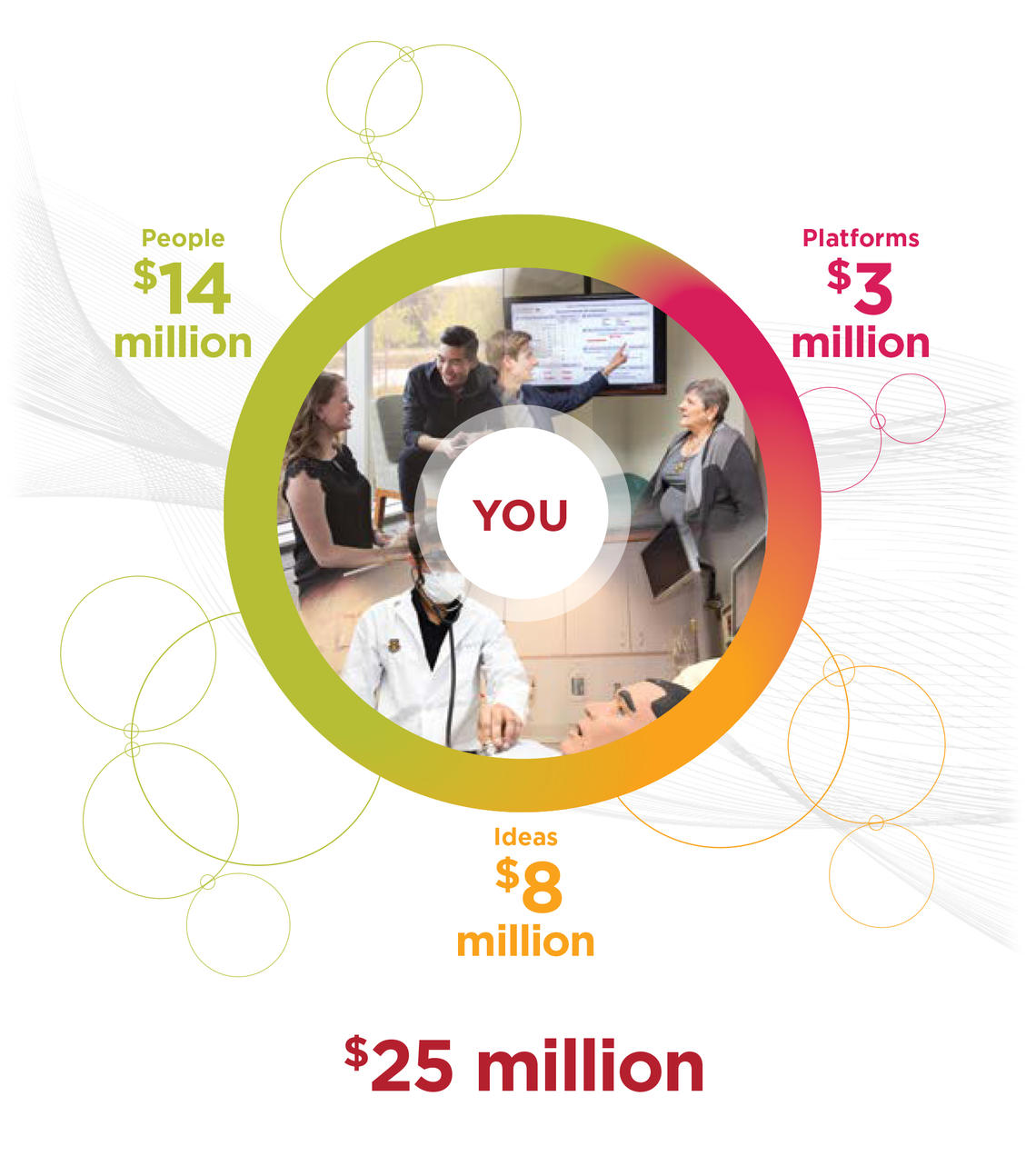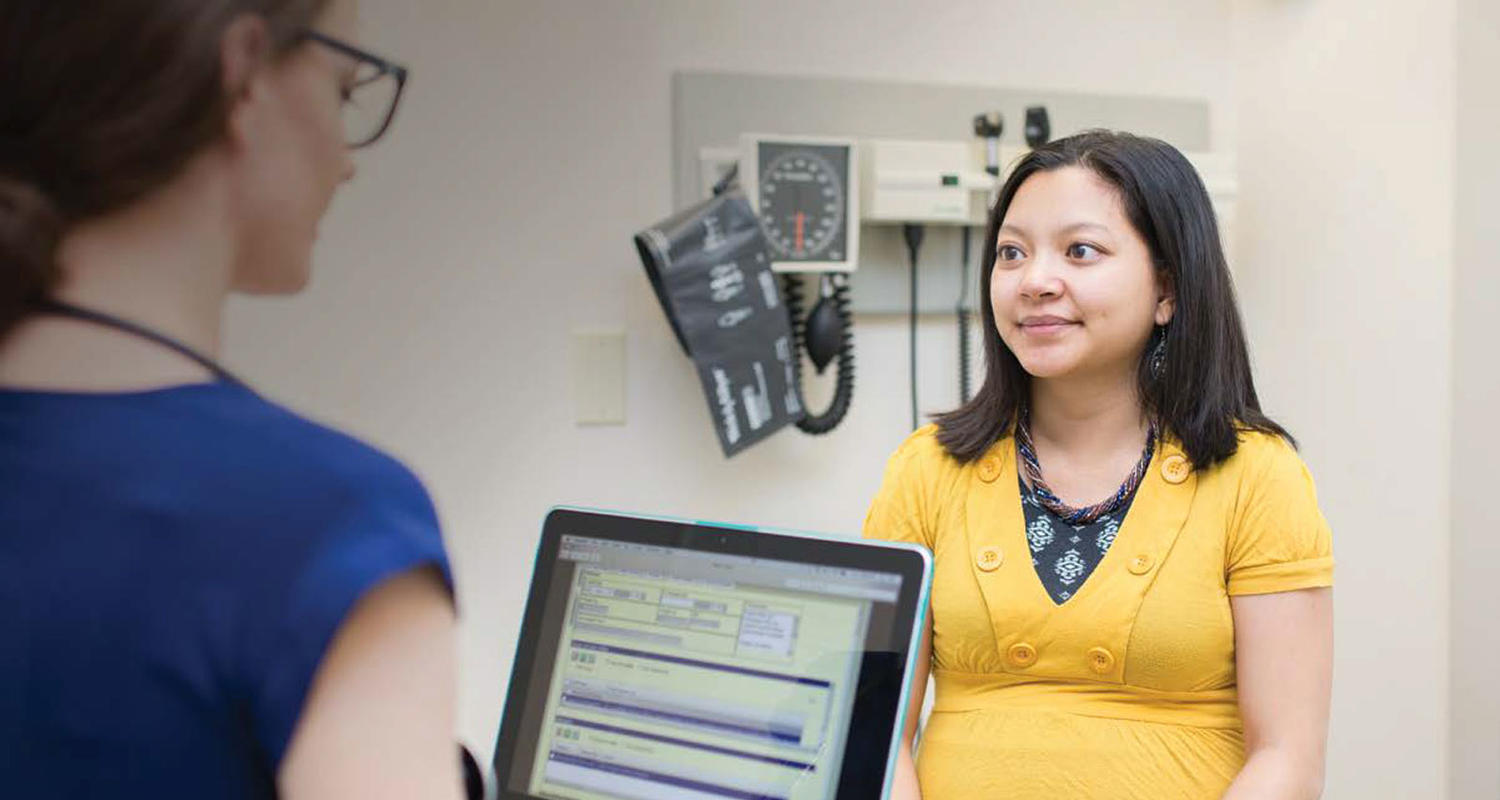How are we solving the greatest challenges facing health?
Our health care system is in serious peril. Canadians are aging, and over 60 per cent of us have a chronic disease needing care.
With almost 50 cents of every tax dollar currently going to health care, the system is simply not sustainable. Canada’s health care system has many strengths, but without evolving to meet critical challenges like spiraling costs, access to services and waiting times, it will shatter.
The answers lie within the work of the O’Brien Institute for Public Health at the University of Calgary. Solutions are being developed by more than 400 academics and professionals, including research scientists, clinicians, health system decision-makers and other experts. Together, we are building better health and better health care.
Better health is about ideas and actions to improve the health of individuals and populations, like reducing obesity or increasing vaccinations. Better health care is about improving the systems we use to deliver health by cutting waste, getting better value for money, finding greater efficiency of services, reducing wait times, boosting safety and improving patient outcomes.
The O’Brien Institute’s work is key to the Cumming School of Medicine’s focus areas of precision medicine and precision public health – the understanding provided through research, data and unique health characteristics that can lead to personalized treatments and therapies for individuals and communities.
Your support of the O’Brien Institute will fuel expertise to innovate and improve the system. We are changing the future of health in three key areas:
- health, wellness and disease prevention
- health systems performance and innovation
- big data and smart analytics
Improving the health of everyone in society.
Advances in medical care and public health policy in the last century have helped increase the average life span by 25 years. From delivering immunization programs, improving care for people with chronic conditions to addressing underlying factors such as poverty, education and food security, pioneers in public health are identifying solutions and advocating for action.
The well-being of our society depends on the health of the people in it. Countries and economies cannot be healthy and thrive when our people are sick. We know that children, youth and adults from socioeconomically disadvantaged backgrounds are most vulnerable to gaps in health.
The O’Brien Institute for Public Health has the skill and the will to have enormous impact here and around the world. Our expertise, combined with strong partnerships with Alberta Health Services (AHS), provincial and federal health ministries and the City of Calgary position us to develop solutions and policies that will benefit our city, province, nation and the world.
Changing the eating habits that are harming Canadians.
Poor diet and unhealthy lifestyles are major contributors to cardiovascular disease, stroke, cancer and obesity. Obesity alone costs the Canadian economy $4.3 billion annually, and decreases the life expectancy of Canadians by an average of seven years per person. O’Brien Institute members Norm Campbell and Charlene Elliott have conducted research and developed policy recommendations on marketing foods to kids and reducing salt and trans fat content in processed foods. They are also looking at how food marketing affects the health of our populations. The development of national food and nutrition policies will help reduce the burden of health conditions caused by poor diets.
Exploring the link between the environment and our health.
Inflammatory Bowel Disease (IBD) is a potentially debilitating and incurable disease of the gastrointestinal tract affecting 233,000 Canadians, and can lead to lifelong pain. Institute member Gil Kaplan was the first to find a link between IBD and air pollution, after conditions including heart and lung disease, stroke, and diabetes were also correlated to the air we breathe. By understanding the cause, we can develop solutions to help those with these diseases.
Health systems performance and innovation

The W21C (Ward of the 21st Century Program) enables researchers to simulate hospital settings to study improvements to the health system.
Let’s save lives — and money — by making the system healthier.
The cost of our health care system is not sustainable in its present state. The high incidence of chronic disease in society, along with the high cost of delivering health care, means spending will continue to increase as our population ages.
However, we have many opportunities to improve our health system. These include using resources appropriately, such as ensuring MRIs are used for the right patient and the right reason; reducing the escalating costs of prescription drugs; and improving care both in the hospital and at home.
Through the O’Brien Institute for Public Health’s work with partners at AHS and in the community, we can
initiate and test new and improved tools and systems for better health care.
Projects focused on better health care, undertaken in close partnership with health system decision-makers, include:
- exploring better ways to manage chronic disease
- expanding the use of eHealth tools to make patients active participants in their care, and to enhance quality and safety of care through improved communications and connectivity
- providing care in people’s homes, rather than in hospitals or clinics
- developing smart analytic programs that give health system decision‑makers real-time information on hospital performance, disease outbreaks and emerging trends in illness
Keeping patients healthy with safe, secure information.
Health providers record a lot of information about a patient while they are in the hospital — diagnosis, medications, care recommendations — that the patient’s regular doctor needs to continue their care. Without that continuity of care, patients can take the wrong medication, be re‑admitted to hospital or suffer other serious health problems. Researchers in the O’Brien Institute for Public Health’s W21C (Ward of
the 21st Century) Program developed the Electronic Transfer of Care Tool, a secure, web-based application that gives community health care providers access to a patient’s critical information. This tool has been implemented in all adult acute care facilities in Calgary, and the project will be adapted for use across Alberta and nationwide.
Big Data and Smart Analytics

Turning information into ideas with impact.
The knowledge we gather about health and disease today equates to significant amounts of data. Information is collected about everything from emergency room capacity and hospital admissions, to chronic disease progression and concussion incidences in Pee Wee hockey. And this data is worthless
without analysis.
Our Big Data and Smart Analytics theme is central to the Cumming School of Medicine precision medicine strategy, as it focuses on developing new data and information methods to improve both the health of our population and our health care system. Being able to use big data to manage health information will lead to important advances:
- improved patient care for diseases like hypertension by using data to determine future treatments and to forecast consequences more accurately
- helping doctors make better decisions and helping them provide better information to their patients
- building knowledge for medical discoveries
O’Brien joins the World Health Organization in a collaborative global health initiative.
Public health research has produced major advances globally, including increased life expectancy, decreased maternal and neonatal death rates and decreased hospital complication rates. The O’Brien Institute for Public Health is contributing to this transformative work through an exciting new partnership with the World Health Organization in the domain of health information. By developing data systems that enable the measurement of worldwide health trends, we can reduce disease, extend lives and improve health.
Learning from the past to save lives today.
The experiences of others can be used to make better health decisions, thanks to the ability of precision medicine to personalize treatment. Procedures used to visualize cardiac events like artery blockages – while vital to helping save a person’s life – can also wreak havoc on the kidneys. Researchers like Matt James use health data to evaluate a patient’s risk so that important steps can be taken to carry out these procedures safely. The information collected through big data, and the insights it provides, is helping physicians make informed decisions to save lives.

$25 million
Take your place among the leading philanthropists of your time.
You will help us attract the rising stars and emerging leaders who will explore innovative new ideas for better health and better health care. Public health research benefits millions of people worldwide, and you will help us continue this vital research. You will elevate Calgary in its prominence as a world leader in the development of solutions for some of the most pressing health problems facing society.
With your support we can bring the ideas of the O’Brien Institute to Albertans, and the world.
Together, we will ensure good health for all.
We are strategically positioned through well-established partnerships with government and health system decision-makers to leverage our ideas to inform and improve health policy, as well as make key changes within our health system. By supporting the O’Brien Institute for Public Health in these three areas, you will help us improve decision-making and reduce waste in the health system.
People - $14 million
With your support, we will recruit and retain the brightest minds in research by:
- attracting and supporting dedicated students to drive the discovery and implementation of visionary ideas. Fellowships, scholarships for Masters and PhD students and Public Health Scholarship Funds will support students today and in the future
- recruiting the best faculty will address health issues affecting millions around the world. To ensure our faculty can devote their energies to research and teaching, we are seeking investment in professorships, chairs and recruitment
Ideas - $8 million
The O’Brien Institute for Public Health is an engine for innovation and discovery, producing visionary ideas and cost-effective solutions. We will support transformational research by:
- providing critical funding that will drive innovation through new initiatives and entrepreneurial ideas
- advancing research in the areas we excel: global, indigenous, environmental, geographical, population mental health, along with health economics
Platforms - $3 million
Tools and research platforms are required to support our team of more than 400 health professionals, research scientists and clinicians. We will focus our efforts in:
- strengthening the foundations of public health with technical tools to translate information into meaningful public health interventions
- high performance computing infrastructure resources to advance our understanding and use of data to inform health decisions











